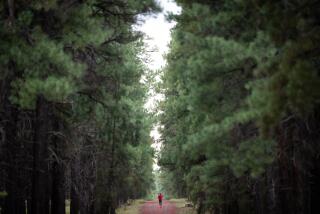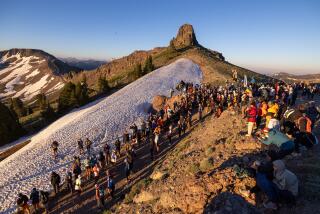Endurance on the Edge : An Orange County team will be among about 50 looking for glory in the world’s ultimate stress test--the rugged Raid Gauloises.
- Share via
The trick, they tell you, is to think of it as fun.
Sure, it might involve lowering yourself over a 400-foot cliff, being tossed like a tiddlywink over white-water rapids, or feeling so exhausted the thought of bedding down on a leech-infested trail sounds like pure heaven.
But, this is adventure racing. You’ve got to love it, its disciples say. Otherwise, you may not survive.
Next Monday some 50 five-person teams, including one from Orange County and another five from elsewhere in Southern California--will gather in rugged Patagonia for the start of the annual Raid Gauloises. The race is an ultra-endurance competition that requires teams of men and women to navigate their way across hundreds of miles of wilderness. Athletes travel by horseback, canoe, kayak and on foot across snow, mountains and glaciers. Officials estimate it will take seven to 10 days to complete. Many teams will average less than two hours of sleep per night.
The five Orange County athletes organized as Team Rockport left Monday night for Bariloche, Argentina, where they will meet up with other competitors. David Allen of Irvine, Lydia D’Alessandro of Fountain Valley, Jan Richardson of Santa Ana, Kent Street of Mission Viejo and Arend Westra of San Clemente have been training for this event for nearly two years.
As with previous editions of Raid Gauloises--held in New Zealand, Costa Rica, New Caledonia, Oman, Madagascar and the jungles of Malaysian Borneo--the 1995 competition demands a healthy respect for mother nature. Patagonia, encompassing the southern parts of Chile and Argentina, features a million square miles of wilderness and a harsh combination of ice, snow, heat and relentless Antarctic winds.
The athletes will ride horseback as the gauchos do--atop wooden saddles. They’ll don snowshoes and crampons. They’ll carry 30 to 50 pounds of gear. They’ll risk altitude sickness and avalanches and hope they’re not swallowed whole by crevasses.
The reward? The winning team nets $40,000, a decent purse until you consider the registration fees ($15,000 per team), travel and equipment expenses ($40,000 to $50,000) and time and energy spent training.
And don’t forget: Half the teams don’t make it to the finish.
“People always say to me, ‘Well, what do you get if you win?’ ” says Gail Verwey, a 33-year-old Raid Gauloises veteran and marketing consultant from Redondo Beach. “I don’t even think about that. I do it because I love the experience.”
In the past, that experience has included crawling through underground caves, making pit stops to remove leeches from one’s body, and shimmying down a rope that cobras simultaneously chose to climb.
Is this a competition--or a mass channeling of Indiana Jones?
“It’s way off the scale of being crazy,” says Julie Leach, an Irvine resident who entered--and won--the Hawaii Ironman triathlon five months after being hit by a car and breaking her leg. Leach, a two-time Olympian, has no interest in this event. “You could die out there,” she says.
Apparently, that’s part of the attraction.
The Raid Gauloises, sports psychologists say, attracts personalities that thrive on overcoming challenges, the tougher the better. In the 1970s, that might have meant running marathons. In the ‘80s, it often meant competing in triathlons. Now that those sports are considered passe, challenge seekers have moved on, creating the next niche.
“Some people race sports cars, others jump out of airplanes,” says Ken Ravizza, a professor of sports psychology at Cal State Fullerton. “These people need to push the edge. It gives them meaning.”
*
In preparation for Raid Gauloises, members of the Orange County team have spent long weekends rock climbing, river rafting, kayaking, hiking, horseback riding and running long into the night. Last month, they practiced glacier crossings at Yosemite, dodged rapids on the Kern River and ran 30 miles with backpacks along rocky trails in the Cleveland National Forest.
“It’s fun. It’s adventurous. It’s ‘Gee, let’s see if we can get to the next spot,’ ” says D’Alessandro, 34, a fifth-grade teacher in Santa Ana who competes in ultramarathons of 50 to 100 miles or more.
The downside of the Raid, she said, is that with its endless hours of preparation, the event becomes a participant’s sole focus.
“Friends get married--you send a card. Friends want you to come to their baby shower--you send a card,” D’Alessandro says. “You have no social life.”
That hasn’t seemed to deter the would-be Raid-ers of the world. The event, created seven years ago by French journalist Gerard Fusil, has become so popular that there was a waiting list to get in this year. Raid Gauloises spinoffs have popped up from Europe to Africa to the southern Utah desert.
The Utah race, last spring’s Eco-Challenge, was held despite protests by environmentalists who argued that the desert’s fragile ecosystem is no place for a bunch of thrill-seekers to get their kicks. Although the Bureau of Land Management ultimately gave the Eco-Challenge the green light, the controversy didn’t help the sport’s image.
The perceptions--of adventure racers being motivated primarily by ego, of men and women forging into the wilds to relieve some sort of societal Angst --do not sit well with the sport’s participants. Nor does the suggestion that their urge to conquer the elements may have less to do with primal instinct than it does with society’s recent infatuation with the great outdoors.
Street, of Team Rockport, says people can theorize all they want. His reasons for competing in the Raid, he says, are his own.
“If they didn’t have the Raid Gauloises,” the 53 year-old logistics analyst says, “I would do something like this anyway.”
No doubt. The former Marine master sergeant has logged more than 80,000 miles of running, not missing a day since 1974. He’s competed in numerous ultramarathons and is considering the Marathon des Sables, a footrace across North Africa. Or the Mt. Everest marathon in Nepal.
The Raid Gauloises intrigues him, he says, because of its incredible demands on both the muscles and the mind. And being a team competition--all five team members must stick together from start to finish--adds the extra challenge of setting aside individual egos for the betterment of the group.
But mostly, Street wants Team Rockport to redeem itself after its poor showing at last summer’s Eco-Challenge. The team dropped out after five days because of poor navigation, wicked blisters and a breakdown of morale. (Two team members have since been replaced).
“I had never dropped out of anything before,” Street says. “I don’t take defeat very lightly. I’m absolutely determined to finish this time.”
It is that compulsion, that drive, that separates these athletes from the weekend variety, sports psychologists say.
San Diego psychologist Barbara Alvarez Warren, whose twin sister, Angelika Castaneda, competed in the Raid Gauloises in Borneo last year, has done personality studies on adventure racing veterans. Most exhibit a degree of obsessive-compulsive tendencies, she says, as well as a high tolerance for frustration and delayed gratification.
As an adventure racer, “you feel you can wait and wait and wait and know the reward will be somewhere,” she says.
Warren believes some adventure athletes experience a type of post-tramautic stress syndrome weeks or months after the event, making them feel compelled to return.
“They have this enormous drive to go back,” Warren says. “Like it’s not finished. They could have done better. They could have slept less. They could have, would have, should have. . . . “It’s like going back to the scene of the crime. They’re drawn to go back to resolve it.”
As for critics who dismiss adventure racers as the lunatic fringe of the sporting community, Warren, an ultramarathoner and triathlete, says she has heard it all before. Adventure athletes are not any more masochistic or crazy than others, she says. Many develop a spiritual connection with their sport. Others try it once and never want to go back.
*
Allen, of Team Rockport, says he sees the Raid as the ultimate self-test.
“It’s not so much ‘look at me,’ but look at myself,” the 30-year-old FA/18 pilot says. “It’s a way to check yourself out.”
That, adventure racers say, is what it’s all about. Testing your limits, testing your mind. Challenging yourself like never before. Going without sleep, being cold, wet, mud-caked and miserable, yet somehow summoning the will to carry on.
“If three years ago, someone had told me I would run 100 miles, I would have cracked up laughing,” D’Alessandro says. But in training for the Raid Gauloises, “I’m always breaking new barriers.
“Every day, I learn there is no barrier. You can always set another limit. You can always reach another goal. Doing the Raid makes me believe that.”
(BEGIN TEXT OF INFOBOX / INFOGRAPHIC)
About Raid Gauloises
What: An ultra-endurance competition requiring teams to navigate across hundreds of miles of wilderness using non-motorized means. Participants will cross snow, mountains, glaciers and lakes and rivers.
Where: Patagonia wilderness in southern Argentina. Race route announced 36 hours before starting time. The French race is in a new location each year.
When: Begins Monday; expected to take seven to 10 days to complete.
Who: 250 athletes in five-person teams, including Team Rockport from Orange County. Six of the seven American teams are based in Southern California.
Team Rockport of Orange County
David Allen, 30, Irvine, Marine Corps pilot
Lydia D’Alessandro, 34, Fountain Valley, elementary schoolteacher
Jan Richardson, 57, Santa Ana, independent contractor and kayaking instructor
Kent Street, 53, Mission Viejo, logistics analyst
Arend Westra, 29, San Clemente, Marine Corps pilot
Race Rigors
Team Rockport members expect to:
* Burn an estimated 8,000 to 10,000 calories each, per day. (An average sedentary adult burns approximately 2,000 calories a day.)
* Eat energy bars, protein powder, beef and turkey jerky, Jolly Rancher candies, caramels, energy drinks and dehydrated meals (chicken a la king, beef stew, chili and beans).
* Use a small, portable water filter to sterilize water en route.
* Take an anti-malarial medication every day.
* Carry required safety gear including: lighter, whistle, compass, dagger-type knife, six distress flares, headlamp, survival blanket, altimeter, machete and first-aid kit.
* Sleep about two hours per night.
More to Read
Sign up for The Wild
We’ll help you find the best places to hike, bike and run, as well as the perfect silent spots for meditation and yoga.
You may occasionally receive promotional content from the Los Angeles Times.






